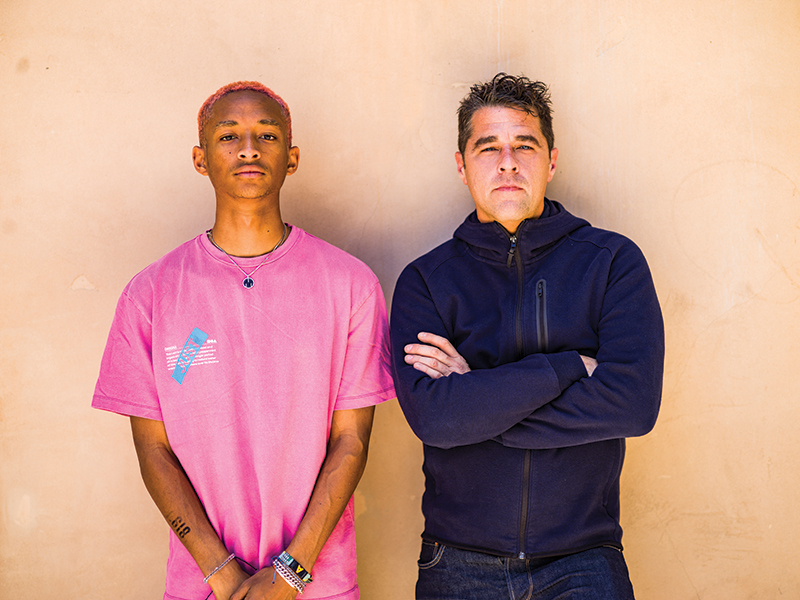
Right around the time the nation’s media and political elite began treating the Flint water crisis as a gruesome historical episode as opposed to simply acknowledging it as the ongoing problem it continues to be, a scion of Hollywood was only getting started on their efforts to end it. Jaden Smith, the 21-year-old, actor-rapper son of Hollywood power couple, Will Smith and Jada Pinkett-Smith known for his roles in The Pursuit of Happyness, The Karate Kid, and After Earth, had already donated some countless pallets of bottled water to be distributed to residents that were fearful of using the city’s contaminated tap water. But the logistical and financial challenges of a years-long water giveaway, and the monumental environmental costs that would be wrought by millions of discarded plastic bottles, prompted Smith along with his activism and business collaborator, Drew FitzGerald, to seek a better way.
Thus was born The Water Box. It’s a mobile filtration system that can quickly cleanse large
volumes of tap water. The unit was designed by Jaron Rothkop, a Royal Oak-based engineer who was collared into the project in 2017 by Smith and FitzGerald’s nonprofit, 501CThree, because of Rothkop’s longtime efforts to use technology to address resource problems around the world. “It’s a fantastic opportunity to be able to apply things I’ve learned working in some of the most remote places on the planet 45 minutes up the road in Flint,” says Rothkop, president of The Last Kilometer, a Sterling Heights-based nonprofit focused on clean energy policy and technology. “It’s also distressing that we have these kinds of water quality problems in the United States.”
The first box began supplying clean water to visitors stopping by First Trinity Missionary
Baptist Church outside of downtown Flint in March, and the device has been such a success that two more were expected to be deployed around other areas of the city before summer’s end. Within its first 50 days of operation, some 5,500 gallons have been distributed, preventing the use of more than 43,000 single-use, 16-ounce plastic bottles.
“We’ve kind of been tracking the progress in Flint since the beginning and supplying Flint with clean water,” Smith told talk-show host Ellen DeGeneres in early June. “Bottles of water aren’t always the most efficient thing. With this system, people can come with five- or 10-gallon drums and just fill up for free in 60 seconds.”
Flint, infamously, began struggling with forms of lead contamination in its municipal water in April 2014 after a state-appointed emergency manager switched the source from Lake Huron to the Flint River without treating the water with chemicals that prevent corrosion of the city’s pipes. Residents complained vociferously about the smell, color, and taste and noted a range of health problems. Yet, state officials dismissed the concerns until late 2015 when a local pediatrician, Dr. Mona Hanna-Attisha, and a University of Virginia water expert proved that thousands of local children suffered dangerous levels of lead in their blood. Lead contamination is especially harmful to children as it is known to cause irreparable harm to brain development.

The world was riveted by the calamity in Flint throughout 2016, but interest and donations waned after the water supply was switched back to Lake Huron, and city, state, and federal authorities began to tout an ambitious effort to replace lead pipes throughout Flint. An unceasing parade of both Hollywood and political royalty flocked to the city to show their concern when the crisis was leading the news, but Smith has become one of few who’ve remained consistently involved, shares Catrina Tillman, the wife of First Trinity’s pastor. “Many celebrities have used the Flint crisis for their own public relations,” she says. “Jaden Smith is serious. It’s not over with him and he doesn’t see it as about him. He has shown real commitment.”
While the Michigan Department of Environmental Quality insists the city’s tap water is now safe, many residents remain both terrified and very distrustful. “Too many public declarations about the safety of the water have been proven to be wrong,” says Rothkop. “They were being told the water was safe to drink even when foul-smelling water that burns their skin was coming out of the tap, so that left them questioning any official version of the safety of the water.”
Smith, FitzGerald, and Rothkop knew trust would be key, which is exactly why The Water Box program includes money to test for lead content and acidity on site every time the machine is used and for microbiological contaminants via a private certified lab every two weeks. A more intensive, comprehensive test of water quality is also done every quarter. All of the test results are posted online at firsttrinitywater.com.
Rothkop estimates the first box will cost $50,000 this year to operate — that includes the price of the unit, replacement filters, testing, and also the host’s water bill — but that device design changes will lower future initial costs and the ongoing expenses after the first year will fall significantly. “It’s made with common commercially available parts. Our objective was to come up with a design where anyone could buy the parts and put it together themselves,” he says. “We wanted to show that there is a better way to respond to a water emergency than relying on trillions of single-use bottles of water to be trucked in year after year.”
Smith has frequently used his family’s celebrity to bring attention to Flint. His mother appeared with him to unveil the first Water Box in March, and in June, his father’s production company, Overbrook Entertainment, announced plans to shoot a Flint-set murder mystery film there. With the advent of The Water Box, he’s taken that connection to a new level. “It’s the most powerful thing I’ve ever been a part of in my life,” Smith says in an online video touting the invention. “There’s still so much more work that needs to be done.”
|
|
|











